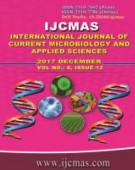


 National Academy of Agricultural Sciences (NAAS)
National Academy of Agricultural Sciences (NAAS)

|
PRINT ISSN : 2319-7692
Online ISSN : 2319-7706 Issues : 12 per year Publisher : Excellent Publishers Email : editorijcmas@gmail.com / submit@ijcmas.com Editor-in-chief: Dr.M.Prakash Index Copernicus ICV 2018: 95.39 NAAS RATING 2020: 5.38 |
Food safety is an increasingly important public health issue. It refers to the conditions and practices that preserve the quality of food to prevent contaminated microbes or toxic chemicals resulting in food borne illness. Most food borne illness is preventable if food protection principles are followed from production to consumption, to ensure safety. The proper implementation of good hygienic practices (GHPs) in the production of food and its proper storage at the right temperature are two cornerstones for preventing microbial potentials and to keep food safe for human consumption. However, the critical link in this chain is home food preparation, where most of the food borne illness can be prevented by avoiding contamination during handling, preparation, and storage of food. Refrigerators are one of the most important kitchen appliances found in homes used in storing and keeping food products so as to prolong the shelf-life of the foods. Cooling is a popular food storage technique and works by controlling the rate of certain chemical and enzymatic reactions as well as rate of growth of food microorganisms. The food borne illness initiated in domestic refrigerator may be attributed to inappropriate food storage including ineffective chill storage and refrigerator management. Failure to follow correct practices in the maintenance, use or cleaning of domestic refrigerator poses a number of risks to consumers. Microbial contamination caused by unwashed raw foods, hands, leaking packages, utensil surface, etc are introduced to domestic refrigerator and can directly contaminate other stored foods. Consumers should learn to ensure that only safe food reaches their tables. Public education and community participation are recognized as important strategies to improve food safety and prevent food borne diseases.
 |
 |
 |
 |
 |